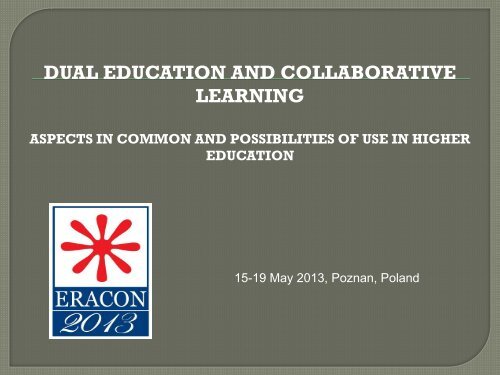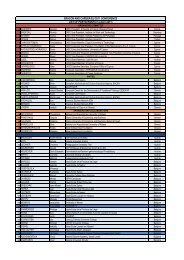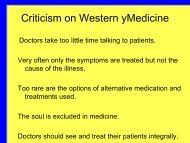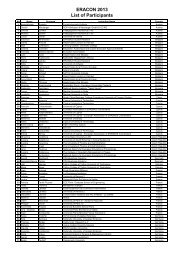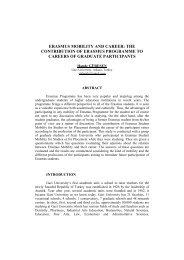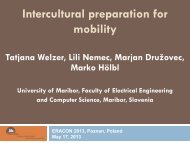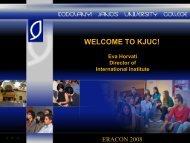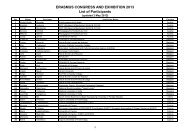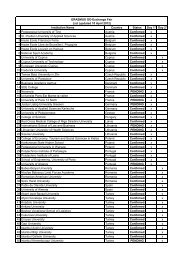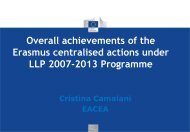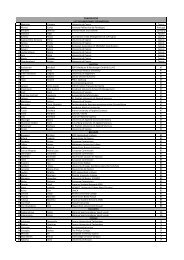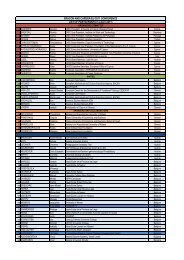Pedro Antonio Balaguer Mora, Spain.pdf - Eracon.info
Pedro Antonio Balaguer Mora, Spain.pdf - Eracon.info
Pedro Antonio Balaguer Mora, Spain.pdf - Eracon.info
You also want an ePaper? Increase the reach of your titles
YUMPU automatically turns print PDFs into web optimized ePapers that Google loves.
DUAL EDUCATION AND COLLABORATIVE<br />
LEARNING<br />
ASPECTS IN COMMON AND POSSIBILITIES OF USE IN HIGHER<br />
EDUCATION<br />
15-19 May 2013, Poznan, Poland
<strong>Pedro</strong> <strong>Balaguer</strong>. Erasmus Coordinator<br />
IES la Creueta Vocational Trainig School<br />
Phone, fax, mails<br />
<strong>Pedro</strong> <strong>Balaguer</strong><br />
Onil, Alicante, <strong>Spain</strong><br />
Erasmus Coordinator<br />
IES LA CREUETA<br />
Map<br />
VOCATIONAL TRAINING SCHOOL<br />
Onil, Alicante, <strong>Spain</strong><br />
abalaguer969p@cv.gva.es<br />
Phone: 0034 672677311
OUR VOCATIONAL TRAINING OFFER<br />
MEDIUM LEVEL (16 years): Sport and Physical Activities in the Environment<br />
(Mountain Guide)<br />
HIGH LEVEL (18 years): Animation of Physical and Sports Activities,<br />
International Trade and Marketing, Transport Management.<br />
We participate in LLP:<br />
-Leonardo Projects/Mobilities<br />
- Erasmus mobilities<br />
Related to recreational and<br />
sporting activities, with a strong<br />
commitment to implement<br />
environmental education and<br />
looking for partners for projects of<br />
this type
In our center we are in the exploratory<br />
phase to implement dual education<br />
We apply innovation in educational<br />
methodology (collaborative learning)<br />
This presentation is the result of our<br />
reflections and initial contacts with the<br />
entrepreneurs in the region
CLARIFICATION OF CONCEPTS<br />
1) In academia sphere and in the business world the concepts of dual<br />
education and work based learning are increasingly used without<br />
distinction. We prefer to speak of dual education because is a more<br />
comprehensive term and includes the term work based learning, since<br />
according to the Organisation for Economic Co-operation and<br />
Development (OECD) dual education has two parts: school based<br />
learning and work based learning.<br />
2) Both terms (dual education and work based learning) are usually used as<br />
synonyms, depending the use of one or other on geographical areas<br />
and/or levels of education: work based learning is used more in Anglo-<br />
Saxon countries and dual education is a more "European " term, based on<br />
the popularity of this education system in Germany and other countries<br />
and usually referred to vocational training
DUAL EDUCATION/WORK-BASED LEARNING<br />
Originally the dual system was designed to define a reality related to vocational<br />
training<br />
In recent years the term is also beginning to use in universities, especially in<br />
Latin America<br />
Interestingly the term wbl is also starting to be used increasingly in the<br />
vocational training<br />
From our point of view and according with the purpose of this communication we<br />
are talking about the same thing
DEFINITION<br />
<br />
<br />
<br />
In Dual education/work-based learning system students are parttime<br />
employees whose programme of study is embedded in the<br />
workplace and is designed to meet the learning needs of the<br />
employees and the aims of the organisation<br />
Dual education/work-based learning in HEIs is the term being<br />
used to describe a class of HEIs programmes that bring together<br />
HEIs and work organizations to create new learning opportunities<br />
in workplaces<br />
A definition of Dual education/ work –based learning for the<br />
higher education level could involve any of the following types:<br />
learning through work, learning for work and learning at work.
DUAL EDUCATION<br />
Agents involved<br />
EDUCATION AUTHORITIES<br />
HIGHER EDUCATION INSTITUTIONS<br />
COMPANIES<br />
Information<br />
Promotion<br />
Acknowledgment<br />
Etc.<br />
Promotion<br />
Pedagogical Innovation<br />
Staff recycling<br />
Agreements with companies<br />
Etc.<br />
Staff motivation<br />
Agreements with HEIs<br />
Pedagogical skills<br />
Etc.<br />
STUDENTS/WORKERS
MAIN IDEA<br />
- When/if using collaborative learning<br />
institutions involved in dual education are<br />
encouraging their students to get some<br />
of the skills that will be useful in the<br />
world of work, either as employees or<br />
businessmen
COLLABORATIVE LEARNING<br />
Collaborative learning is a type of active learning that<br />
takes place in student teams<br />
It centers on the students’ discovery, study and use of<br />
<strong>info</strong>rmation in a collaborative manner, rather than an<br />
instructor simply lecturing and the students<br />
individually, passively taking notes<br />
Frequently use problem solving technique that requires<br />
interpretation, assessment, evaluation, comparison,<br />
synthesis, and so on. Such problem solving processes<br />
also mirror “real world” working environments
COLLABORATIVE LEARNING SKILLS<br />
Peer coaching<br />
Active<br />
Participation/communication<br />
Team work spirit<br />
Division of tasks<br />
Debates, feedbacks and evaluations<br />
Problem solving skills<br />
Decision making/Initiative<br />
Contact with open ended situations/take risks<br />
Responsibility<br />
Creativity
We selected a group of “qualities of the good<br />
entrepreneur” and present them to 15<br />
entrepreneurs in our region dedicated to<br />
different economic activities (toys, adventure,<br />
hotels, etc.). Top 12 chosen were the following
Qualities of a good entrepreneur<br />
Effective leadership<br />
Setting goals, measuring performance<br />
Coaching skills<br />
Empower and delegate<br />
Control of 'risk areas'<br />
Adapt to change<br />
Communication skills<br />
Negotiation skills<br />
Motivate and generate enthusiasm<br />
Build teamwork<br />
Establish cooperation<br />
Creativity and innovation<br />
http://www.london.edu/programmes/executiveeducati<br />
on/hpps/benefits.html
We selected a group of “qualities of<br />
the good worker” and present them<br />
to the same 15 entrepreneurs. Top<br />
12 chosen were the following
GOOD WORKER SKILLS<br />
· Thinking Creatively<br />
· Decisions Making<br />
· Problem Solving<br />
‘ Autonomous<br />
· Responsible<br />
· Communication/participation<br />
· Honest<br />
· Adaptable and Flexible<br />
· Team Spirit<br />
· Punctual and Efficient<br />
· Well Groomed<br />
· Cooperative
Overlaping skills<br />
Collaborative learning<br />
Entrepreneur<br />
Peer coaching<br />
Coaching skills / Effective leadership<br />
Active<br />
Enthusiasm / Effective leadership<br />
Participation/Communication<br />
Communication skills / Effective leadership<br />
Teamwork spirit<br />
Build teamwork / Empower and delegate<br />
Division of tasks<br />
Empower and delegate / Negotiation skilss<br />
Debates and evaluations<br />
Measuring performances / Negotiation skills<br />
Problem solving skills<br />
Control of risk areas / Measuring performances<br />
Decision making/initiative<br />
Effective leadership / Communication skills<br />
Open ended situations/risks<br />
Responsibility<br />
Control of risk areas / Effective leadership<br />
Setting goals / Measurimg performances<br />
Creativity<br />
Creativity and innovation
Overlaping skills<br />
Collaborative learning<br />
Job seeker<br />
Peer coaching<br />
Cooperative / Team spirit<br />
Active<br />
Autonomous / Participation<br />
Participation/Communication<br />
Communication / Cooperative<br />
Teamwork spirit<br />
Team spirit / Cooperative<br />
Division of tasks<br />
Flexible / Cooperative<br />
Debates and evaluations<br />
Decisions making / Team spirit<br />
Problem solving skills<br />
Problem solving / Responsible<br />
Decision making/initiative<br />
Decision making / Responsible<br />
Open ended situations/risks<br />
Thinking creatively / Autonomous<br />
Responsibility<br />
Responsible / Honest<br />
Creativity<br />
Thinkng creatively / Autonomous
Clearly aspects in common<br />
1)Active / Cooperative behaviour<br />
2)Commitment to participate<br />
3)Workteam spirit<br />
4)Innovation and creativity (business creativity)
CONCLUSION<br />
Using collaborative learning students develop<br />
skills that will be needed in the world of work,<br />
either as employers or employees<br />
A company that incorporates students trained<br />
in collaborative learning will be more<br />
competitive<br />
The HEIs using collaborative learning will be<br />
more competitive and attractive to the business<br />
world when establishing partnerships in dual<br />
education
THANK YOU


